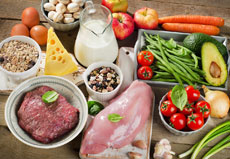Tip: Eat smart today for strong bones and healthy, pain-free joints for life!

By the Chef Marshall O’Brien Group
More than half of Americans over the age of 18 are affected by musculoskeletal conditions. Along with keeping active and maintaining a healthy weight, the right nutrition can help prevent bone and joint conditions from developing, and help reduce symptoms for the many of us who already suffer from arthritis, osteoporosis and other musculoskeletal ailments. In honor of Bone and Joint Health National Awareness Week, we highlight smart choices that help you eat your way to a strong, pain-free body. And here’s a link to our Herby Salmon Fillet recipe, full of the right nutrients to get you off to a great start!
Eat Your Way to Strong Bones
You may believe bones are stable, unchanging objects, but they are in a perpetual state of remodeling, adapting to the ways you use them and the nutrition you provide. Most of your skeleton is replaced about every 10 years. By eating smart and getting regular exercise now, you can build strong bones for your future.
- Calcium – Dairy (milk, yogurt, cheese) and leafy green vegetables (broccoli, kale and spinach) are excellent sources of calcium, the major building block of bone tissue. When you do not get enough calcium in your diet, your bones become weaker and more prone to fracture. Eat three to four servings of calcium-rich foods daily to maintain strong bones.
- Vitamin D – Your body needs vitamin D to absorb dietary calcium. When you don’t get enough vitamin D, your body takes calcium from its stores in the skeleton, weakening existing bone and preventing formation of strong new bone. While you can get some vitamin D from food – oily fish, cod liver oil, mushrooms and eggs, as well as fortified milk, yogurt, orange juice and cereals – your best source is sunlight. Consider a vitamin D supplement during winter months when it is impossible to get sufficient vitamin D from the sun in northern climates.
- Lean Protein– Eggs, fish, poultry, lean meats, dairy, legumes, whole grains, nuts and seeds are excellent sources of protein, which is essential for optimal bone mass gain during childhood and adolescence, and for preserving bone mass with aging. Lack of protein in the elderly is associated with less strength, greater risk of falls and poor recovery in patients with bone fractures.
- Fruits and Veggies – High consumption of fruits and vegetables is associated with increased bone density in elderly men and women. Fruits and vegetables provide many nutrients that are important for building strong bones.
- Other Nutrients – Vitamin B6, B12 and folic acid may reduce fracture risk by helping convert homocysteine – which may be linked to lower bone density - into other amino acids. Magnesium, vitamin K and zinc all play important roles in bone mineralization and tissue renewal.
Nutrition for Healthy Joints
Arthritis affects about 20 percent of Americans. These anti-inflammatory foods prevent the worsening of symptoms and help cool the pain of arthritis.
- Healthy Fats – Fatty fish, including salmon, herring, mackerel, sardines, anchovies and rainbow trout, are your best dietary sources of omega-3 fatty acids, which are particularly effective at reducing inflammation and supporting joint health. Ground flaxseeds, walnuts, seaweed, soybeans and omega-3 fortified eggs also provide omega-3s, but in a form that is not as useful to your body. Olive oil contains a compound with similar properties to non-steroidal anti-inflammatory drugs.
- Vitamin C – This powerful antioxidant, found in citrus fruits, bell peppers and strawberries, reduces tissue damage at inflammation sites and may help prevent inflammatory arthritis and support joints with osteoarthritis.
- Whole Grains – Whole grains that have at least 3 grams of fiber per serving help control blood glucose and inflammation. Avoid foods that are low in fiber and rich in sugars and starches, which trigger inflammation in the body and exacerbate joint pain.
- Fruits and Vegetables – As highly bioavailable sources of vitamins, minerals, fiber and polyphenols with anti-inflammatory activity, fruits and vegetables are one of your best defenses against chronic inflammation. Eat five to nine servings of fruits and vegetables daily to keep your joints healthy and pain-free.
- Spices - Certain spices, like turmeric and ginger, have anti-inflammatory qualities that reduce inflammation and support joint health. Turmeric contains the compound curcumin, which, in a 2009 study, eased pain and improved joint function about as well as ibuprofen in individuals with osteoarthritis.
Eat Right for a Body That Moves You
Your bones and joints provide the structure and mobility that allow you to do what you want to do. Nutritious food choices build strong bones and reduce inflammation that causes painful joints. Eat smart and stay active now, so your bones and joints keep you moving well later in life.
You will love the way you feel!
 The Chef Marshall O’Brien Group is a dedicated assembly of professionals based in Minneapolis, Minnesota, committed to the goal of using nutrition to get kids and families to lead happier, healthier lives.
The Chef Marshall O’Brien Group is a dedicated assembly of professionals based in Minneapolis, Minnesota, committed to the goal of using nutrition to get kids and families to lead happier, healthier lives.